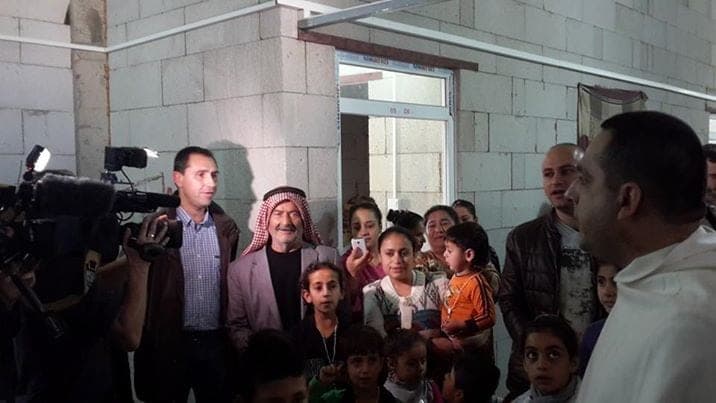ERBIL, IRAQ — In a video message played today in Erbil, Iraq, Pope Francis denounced the “extremist fundamentalist group” targeting the country’s Christian and Yazidi minorities and forcing thousands into exile.
“It is mostly because of an extremist and fundamentalist group that these communities, and others too, ran away, and that all these people are victims of inhuman violence because of their ethnic and religious identity,” the pope said.
Although Francis didn’t specifically name the group, he was referring to ISIS and its self-proclaimed “Caliphate” in Iraq and Syria.
The pope said the rise of the Islamic State has forced minorities in the region to leave “everything behind to save their own lives without betraying their faith.”
“You have this strength that makes you stand firmly in your faith, and it is for us a testimony,” he said. “Today, you are the reeds of God! The reeds that bend under this fierce wind, but which will raise again.”
The message was shown in downtown Erbil, as the closing moment of the “Festival of Lights,” a pilgrimage that began in Lyon, France, on December 5, with a chartered plane led by Cardinal Philippe Barbarin, archbishop of Lyon.
The prelate and a hundred of his flock flew to Iraq with more than 1,700 pounds of candles to recreate a traditional Lyon celebration that attracts more than three million people to the French city every December 8.
According to local authorities, more than 25,000 Christians participated in the ceremony, most of whom are living in the capital of Kurdistan as refugees, after abandoning Mosul and nearby Qaraqosh.
According to a declaration made by Barbarin, the 48-hour visit was to not only to pray for those who are suffering because of their faith, but to pray with them, “walking side by side.”
In many ways, Erbil is now a city in ruins that mere months ago was an up-and-coming commercial hub. Behind church walls, abandoned sport centers, and in the shades of half-finished buildings, up to 400,000 refugees await a more permanent destination that might take years to arrive.
A clear example of this is the “Erbil Mall,” a four-floor structure that was built to be a shopping center. Since July, however, it has become the home for more than 400 families persecuted because they are Christians.
Roaa Hussam is only 15 and together with her parents and three younger siblings, she arrived to the refugee center in August from Qaraqosh. Since she could carry only one bag, she left all her books behind. She studies by using photos of her friends’ books.
When questioned about what she needs, Hussam doesn’t hesitate. “I want a school, so I can finish high school and continue studying to become a doctor,” she said.
Along with her parents, she will eventually get her passport in Baghdad with the hopes of going to Australia, where other members of Hussam’s family have relocated.
Another refugee, too, said education is key to survival.
Nareman Jameel Oolo left Qaraqosh on August 6, a day she says she’ll remember forever.
In clear English she learned by talking to the American soldiers that were in Iraq until 2012, Oolo told Crux that her father was killed when she was only 14, and at the “insistence and great efforts of my mother,” she continued studying.
Oolo is a computer engineer, her sister a pharmacist, and her brother a civil engineer. Together with their mother they live in a cubicle that was installed in what used to be the foundations for a seven-story building.
“I will never be able to repay my mother for what she did for me,” she said. “I wouldn’t be able to talk to you if it wasn’t because she forced me to continue studying.”
Like many others in the refugee center, Oolo doesn’t want to go back to Qaraqosh.
“I’d like to resettle in a place where I need a passport to get there” she told Crux. “I’ve already left everything behind. What’s there for me to leave if I can escape this? I’d like to go to a country that has good movies, like America.”
The Rev. Muhannad Altawil, a Dominican Chaldean priest who was forced out of Iraq 13 years ago, is among those “taking the diocese of Lyon to Mosul.” His entire family has left Iraq, with his parents being the last ones to do so, back in 2008.
“They received a letter from an extremist group, saying they had to leave Baghdad,” he said. “So on the next day, with one luggage each, they left our home.”
In March, the priest went back to his city. There, he ran into the family that had taken over his family’s home. “They’re driving our car, wearing our clothes. They’ve taken possession of everything that was ours,” he said.
Altawil doesn’t have the best memory of the American-led invasions of Iraq, calling them “senseless wars.” But he does favor the current American-led air strikes against ISIS.
In his message, Pope Francis also appealed for a “great international gathering able to solve the conflicts that stain [Iraq and Syria] with blood, to oppose everything that forces people to leave their homeland, and to promote the conditions for them to stay in their houses or to return to them.”
“Christians are expelled from the Middle East with a lot of suffering,” he said. “I thank you for being witnesses; but there is so much suffering in your testimony…Thank you! Thank you, really!”
Though few in the crowd could see the pope, speaking in Italian, or the subtitles, the video moved thousands gathered around the image of Our Lady of the Immaculate Conception to tears.
For Salwan Zator, from the local Babylon media, not knowing what Francis was saying wasn’t a problem.
“The video is proof that he hasn’t forgotten us, that we’re in his prayers,” he said. “That’s what we need. For the world to keep remembering us.”


















